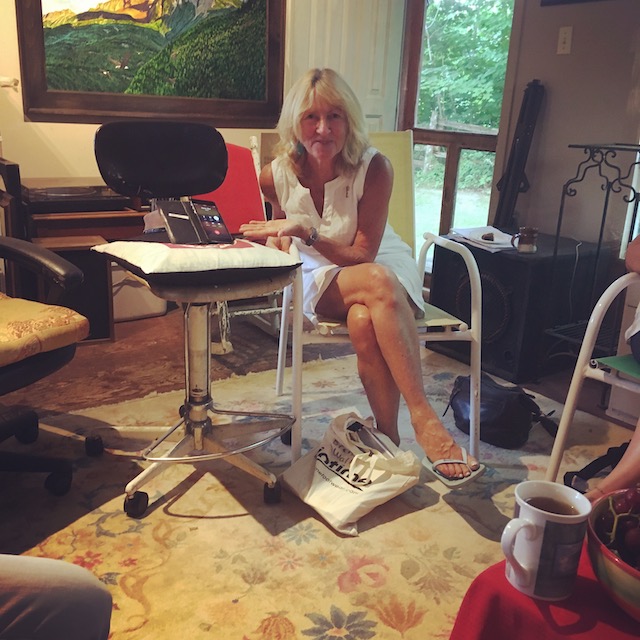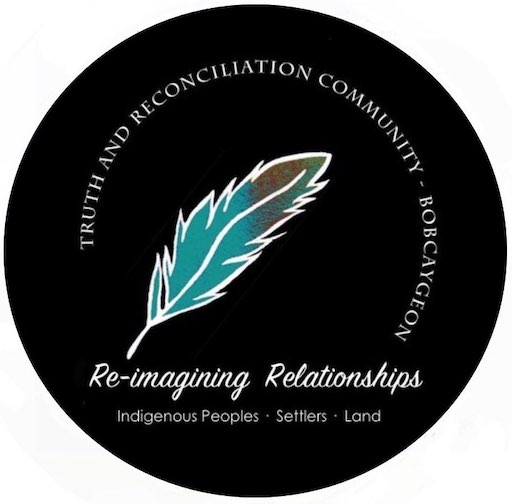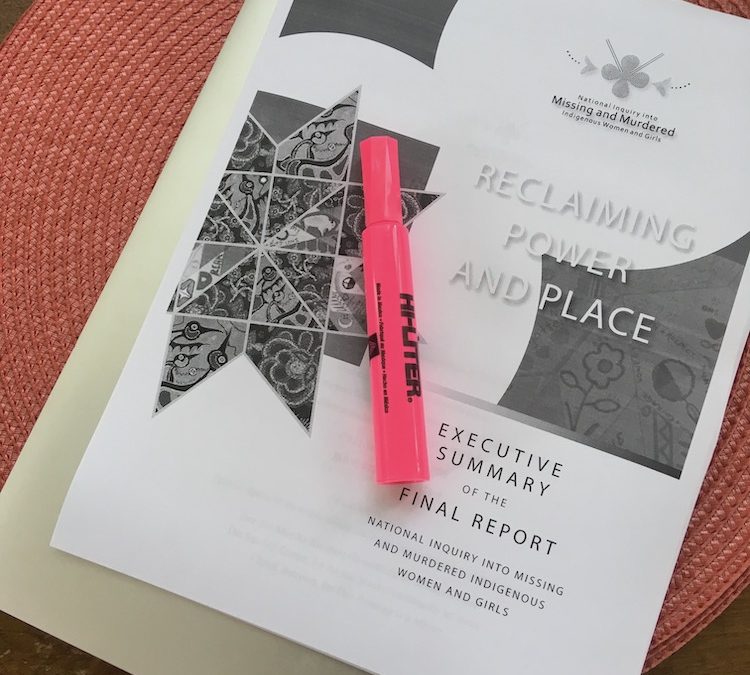Our group had been following the progress of the Inquiry on Murdered and Missing Indigenous women and Girls (MMIWG) in Canada. It was a mammoth undertaking fraught with controversy and we felt that it would be important to inform ourselves on the results.
Because the report is a heavy reading in terms of content and volume, we decided to meet regularly over a couple of months and break the report down into sizeable chunks. It felt important to also be able to process what we had just read and doing this together made sense.
We were lucky to have Barbara Cameron, an associate professor in the Department of Politics at York University join us for the duration of our time together.
She suggested that the discussion group begin by reading certain sections of the Executive Summary and then using these to decide which chunks people wish to focus on.
- Pages 1 to 19 of the Executive Summary that provide an overview of the structure of the report with very brief summaries of the content; then jumping to
- Pages 55 to 59 that outline the Inquiry’s “Principles of Change”;
- Pages 60 to 61 that summarize the Inquiry’s “Overarching Findings”.
- A list of the Inquiry’s specific Calls for Justice begins on page 62 and runs to page 104… then looking through these specific calls to get a sense of what the Inquiry recommended.
Before we started our discussion Barbara also gave us some background to the mobilization that led to the Inquiry.
We went on to the Report itself and selected portions such as Chapter 4 on Colonization to focus on.
When we got to the Calls for Justice, we started a conversation on where we could take action and influence change. We found the 8 Calls for All Canadians on Page 29 of the Calls for Justice a good place to start.
Calls for All Canadians [Page 29 of Calls for Justice]
As the Final Report has shown, and within every encounter, each person has a role to
play in order to combat violence against Indigenous women, girls, and 2SLGBTQQIA people. Beyond those Calls aimed at governments or at specific industries or service providers, we encourage every Canadian to consider how they can give life to these Calls for Justice.
We call on all Canadians to:
15.1 Denounce and speak out against violence against Indigenous women, girls, and 2SLGBTQQIA people.
15.2 Decolonize by learning the true history of Canada and Indigenous history in your
local area. Learn about and celebrate Indigenous Peoples’ history, cultures,
pride, and diversity, acknowledging the land you live on and its importance to
local Indigenous communities, both historically and today.
15.3 Develop knowledge and read the Final Report. Listen to the truths shared, and
acknowledge the burden of these human and Indigenous rights violations, and
how they impact Indigenous women, girls, and 2SLGBTQQIA people today.
15.4 Using what you have learned and some of the resources suggested, become a
strong ally. Being a strong ally involves more than just tolerance; it means
actively working to break down barriers and to support others in every
relationship and encounter in which you participate.
15.5 Confront and speak out against racism, sexism, ignorance, homophobia, and
transphobia, and teach or encourage others to do the same, wherever it occurs:
in your home, in your workplace, or in social settings.
15.6 Protect, support, and promote the safety of women, girls, and 2SLGBTQQIA
people by acknowledging and respecting the value of every person and every
community, as well as the right of Indigenous women, girls, and 2SLGBTQQIA people to generate their own, self-determined solutions.
15.7 Create time and space for relationships based on respect as human beings,
supporting and embracing differences with kindness, love, and respect. Learn
about Indigenous principles of relationship specific to those Nations or
communities in your local area and work, and put them into practice in all of your
relationships with Indigenous Peoples.
15.8 Help hold all governments accountable to act on the Calls for Justice, and to
implement them according to the important principles we set out.
There was so much to unpack during our discussions such as framing this as a Human Rights issue and taking it to international bodies as the path to finally getting some meaningful action.
There was controversy in the press about calling this genocide. After reading the report there is no other conclusion.
We showed up for those discussions week after week even if it was by phone or we were video conferenced in. We also felt that we need to keep showing up in every way we can until significant changes are made at every level of government and policing.
Joining the discussion by phone.

More
Suggested Resources for Learning [Page 30 Calls for Justice]
National Inquiry into Missing and Murdered Indigenous Women and Girls. Our Women and Girls Are Sacred: The Interim Report of the National Inquiry into Missing and Murdered Women and Girls. http://www.mmiwg-ffada.ca/publications/.
National Inquiry into Missing and Murdered Indigenous Women and Girls. Their Voices Will Guide Us: Student and Youth Engagement Guide. http://www.mmiwg-
ffada.ca/publications/.
Transcripts, testimonies, and public statements offered during the Truth-Gathering Process, available at www.mmiwg-ffada.ca/transcripts/ and
http://www.mmiwgffada.ca/part-ii-and-part-iii-knowledge-keeper-expert-and-institutional-hearing-transcripts/.
Suggested Resources for Allyship
Amnesty International. “10 Ways to Be a Genuine Ally to Indigenous Communities.”
https://www.amnesty.org.au/10-ways-to-be-an-ally-to-indigenous-communities/.
Dr. Lynn Gehl. “Ally Bill of Responsibilities.”
http://www.lynngehl.com/uploads/5/0/0/4/5004954/ally_bill_of_responsibilities_poster.pdf.
Indigenous Perspectives Society. “How to Be an Ally to Indigenous People.”
https://ipsociety.ca/news/page/7/.
Montreal Urban Aboriginal Community Strategy Network. “Indigenous Ally Toolkit.”
https://gallery.mailchimp.com/86d28ccd43d4be0cfc11c71a1/files/102bf040-e221-4953a9ef- 9f0c5efc3458/Ally_email.pdf.

